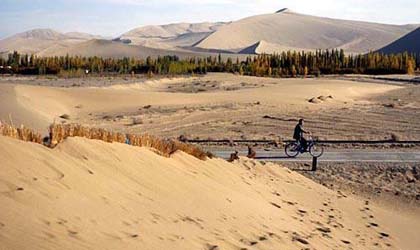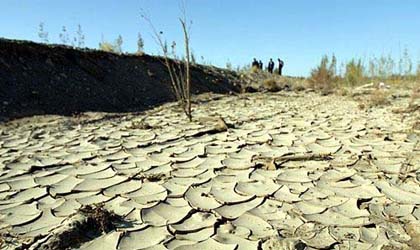Northwest China's Gansu Province has announced it will spend 1.9 billion yuan (US$253 million) in the next three years to protect the environment and archaeological treasures at Dunhuang, a Silk Road city and home to historic Buddhist grottoes.
A man passed by a desertification area in Yangjiaqiao Village, Duhuang City of Gansu Province.
The plan, the province's latest endeavor to reverse the deteriorating environmental situation, listed 20 projects, including upgrading irrigation facilities, converting croplands to grasslands and forests, and diverting 120 million cubic meters of water from the more ample Ha'erteng River to boost water stocks at the city's dwindling Dang River.
The plan also includes relocation of more than 3,000 people over the next three years from areas that are threatened by desertification.
Part of the investment is earmarked for restoring vegetation on mountains near the Mogao Grottoes, to stabilize its statue structures and stop desert expansion. The UN-listed world heritage site known as the Cave of a Thousand Buddhas is home to some of the world's best examples of ancient Buddhist art, dating back 1,500 years.
This measure is a response to climate warming and over-exploitation of water resources that have begun threatening the surrounding environment and cultural relics. Both city and provincial governments have taken repeated measures to patch up the battered environment, but efforts are still weak compared with the rate of ecological degradation.
The Kumtag, China's sixth largest desert, is expanding by one to four meters eastward every year. Its nearest floating dune is only five kilometers from Dunhuang. Statistics from the city hydrological department show underground water levels dropped 10.77 meters from 1975 to 2001, and are still declining by 0.24 meters every year.
Rivers and lakes in the city have shrunk by 80 percent in the past 30 years. The water level at Yueyaquan, a crescent-shaped desert water body, dropped from 7.5 meters in 1960 to only 1.3 meters in 2004.
The dry Danghe River course in Yangjiaqiao Village, Duhuang City of Gansu Province
(Xinhua News Agency November 6, 2007)







